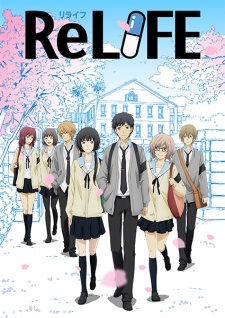
Slice of life, or at least as it's carried out in anime at large, is a genre we are prone to leave behind as we get older and more involved in the rat race of life. When we're in high school the antics in Toradora! or Azumanga Daioh may feel the most familiar, but once we reach college we've left it behind for Genshiken and Honey and Clover, say nothing of reaching the workforce and only having SHIROBAKO and Nana—and eventually Usagi Drop—left to contend with. As we leave high school behind, the high school comedy becomes more of a reminiscence, either coloring our opinion of that adolescent mess with nostalgia or reassuring us that we've moved past that immature period in our lives. We insert our older selves into the fray, projecting our twenty or thirty-something persona onto a teenage body and seeing how we'd use our experience and maturity to mix things up a bit. Or just relive the time when we didn't have to worry about experience or maturity like we do now.
ReLIFE cuts out the middleman and does just that. Our first experiences with the part-timer Kaizaki Arata may be familiar to anyone who has had life or Japanese salaryman culture kick them down a few times, but his meticulous and accommodating approach to his work contrasted with his relaxing beers at the end of the day, all set to a tone of anxiety around his friends for not having his life fully in order, are ubiquitous to most anyone in the working world. His dubious reaction to a strange man approaching him after his convenience store job and offering him an experimental pill, even with the promise of covering his living expenses for a year with a possible job afterwards, is doubly understandable. But of course he takes the pill, and wakes up the next morning in the body of his seventeen-year-old self. After some comical banter between the two, he is sent back to school to spend a year retraining himself to be social, and to bring change and life into his dead-end trajectory.
Most of the show is the high school slice-of-life antics we know all too well, but Kaizaki (as well as the ReLIFE employees overseeing him from their own seventeen-year-old bodies) remains somewhat aloof of the painfully immature bits. His comedy comes from both relearning how to be a student, with all the fruitless studying it entails, and from helping his new group of friends deal with their problems, ones he left behind a long time ago. Appropriately, his tension comes from dealing with girls, not because he's too shy to confess or thinks he doesn't have a chance, but rather because with the age gap it's illegal in most parts of the world. Of course he is also confronted with thoughts about his job as a salaryman that he was fired from before the show, and about the masculine culture that drove his talented and kind senior employee to suicide just for being a woman, but these thoughts aren't driven by an external soap opera so much as his time away from adult life gives him the space to reflect. Both in terms of comedy and personal growth, Kaizaki is handled quite deftly, and the show never forgets where he comes from as a person.
The rest of the cast are a bit more streamlined, realistic in their dialogues and driving concerns but still not scratching much below the surface of their characters. The most complex character outside Kaizaki to me is Kariu, who plays volleyball in the shadow of her best friend Tamarai and is unable to fully sort out her feelings of love for her classmate Oga. We see her desire for perfection first as a way to gain Oga's affection, but then as a compensation for being outshone on the court by a girl she genuinely cares about, who genuinely works hard and strives for excellence in volleyball. Sometimes it is hard to see quite how these two different parts of her character match, and at times it feels like her crush on Oga could have been split off into a different character entirely. But the result would have been two one-dimensional characters rather than one person with two different parts to her life. With the rest of the supporting cast serving more of a comedic role, without too much depth beyond their comically sadistic personalities—and oh are there sadists in this crowd—Kariu is a nice addition to the mix.
I would still advise anyone who isn't a fan of slice-of-life shows to avoid this one, as the outsider status of Kaizaki and Kariu's interesting facets aren't enough to make it unrecognizable as the high school romantic comedy it is at heart. But to longtime fans who look to these shows as a way to escape the pressures of the real world, ReLIFE is a tribute to the surprisingly difficult social scene of adolescence as well as to the bubble it provides to the well-adjusted and the mature, those who have spent years working behind the register practicing day after day to make others maximally happy. It has the technicals of a strong slice-of-life, from an upbeat but erratic piano that comes in with incongruous timing to the clever dialogue that often evokes the sense of real conversations between friends, self-deprecating or teasing in spades. We are ultimately left with an open ending, and with a twist that begs for another season to explore a dark horse character relationship many of us had left for dead. But still, what it gives is fulfilling, asking the older audiences to project themselves onto the lead in an almost uncomfortably literal sense, yet ultimately living up to what we would expect ourselves to do if we too got the magical chance to live out that awkward period of our lives again.